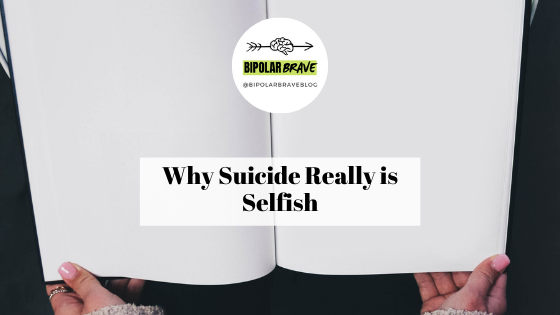When I was battling clinical bipolar depression at 16, I was very close to the edge of attempting suicide.
How I Know My Desire to Kill Myself Was Selfish
When it’s touted that suicide or suicidal thinking is a symptom of mental illness, you can quickly come to the conclusion that it isn’t selfish…It’s a byproduct of mental illness…People with mental illness can’t help themselves…They can’t control that.
Look: I don’t believe we should CONDEMN and write off ourselves or others for their ideations or intent to kill themselves. However, contrary to popular opinion, the desire and act of suicide and taking one’s own life are selfishly motivated things.
The “victim” of suicidal thinking may believe that those around them would be better off without them, which sounds selfless on the surface.
Only, in my experience, the one person I was truly thinking about in the throes of deep suicidal mentality was myself. Me. Only ever me. My pain, my suffering, how killing myself would be the answer to all of that.
The Mirage of Suicide
While one is in that state of mind, suicide is merely a mirage of a reprieve from the numbness of depression. It looks like the best way to end the pain.
To the one having these ideations and desires, it’s a belief; a strong feeling. To the person suffering and contemplating the elimination of their existence, it’s a fallacy. It’s not true that it is a selfless way to end the pain and relieve others of the perceived burden that they think they are.
The reasoning that we should show compassion because the victim is not truly being selfish while contemplating suicide, is clearly popular in the current mainstream of mental health advocacy. “Don’t blame the victim!”
However, that is a slippery slope that will lead to the acceptability of suicide.
I am communicating that suicide is selfish, because it is. NOT because I am looking to condemn everyone who is suffering and wanting to end their own lives.
Quite the opposite!
I want people to realize that while it is selfish to want to kill yourself and follow through on that, I am for their health and preserving their life. I am FOR THEM LIVING.
I UNDERSTAND PAIN and I UNDERSTAND the suffering of mental anguish and illness. I hurt with you because I’ve been there. I understand your pain because I’ve been dealt that hand.
I DO NOT, however, accept and believe that suicide is unselfish. This is THE Lie that permeates our mental health advocacy the most, and I choose to stand up to it.
But Why is Suicide Selfish?
It’s not really rocket science. The pride one must possess to believe he or she MUST end one’s life in order to alleviate pain is not only backward, it is a self-rooted motive.
To want to end your life isn’t just a skewed mental state, it’s a lie that our feeling is true in this state, and so to outsiders looking on, they suppose the mentally ill are not able to help themselves.
“They can’t help it,” many will boast. “They’re suffering from mental illness,” as if it’s the disorder causing them to want, desire, plan, or execute the act.
Watching My Language
As for language, calling suicide “selfish” and saying one “commits” suicide is too strong, nowadays. It is too “victimizing” and politically incorrect. Saying someone “committed” suicide is bad language, the advocates say. Calling is “selfish” is condemning the person. It’s just too “harsh,” in the opinion of sensitive advocacy circles. However, the act and desire to act are not the person.
Let me remind you, that the act of suicide is a harsh thing.
And wanting, desiring, and thinking about acting on the thought of it, is a serious thing.
Changing the language to “soften” the appearance of the act, to soothe our consciences does not change the fact that suicide is selfish, destructive, and permanent.
Wanting to wallow in feelings that others would be better off without them, is self-serving.
One is MOST selfish to conclude that life isn’t worth existing, that they’re essentially their own god, and should be validated for their presumed “uncontrollable” urges. Even if it is to end the emotional and psychological pain they are in.
The assumption that I am not selfish by wanting to die breeds validation of suicidality.
Pride blinds a person into believing the lie that taking one’s life is an acceptable desire to resolve his or her pain and permanently alter their circumstances in this way. Not calling it for what it is — selfish — keeps us from shining light on the truth of the matter.
Making A Clear Distinction
We must distinguish that calling it for what it is, is not the same thing as CONDEMNING the person.
You won’t go to hell for taking your own life. It’s not The Unforgivable Sin. That fact doesn’t excuse you to follow through on it, but as I understand, you aren’t eternally damned for succumbing to the temptation, either.
It is out of love for the person suffering and the preservation of their life that I call a spade a spade.
By not calling it out for what it is, we are led into reasoning that 1) suicide is acceptable and 2) people are not responsible for their own thoughts and actions.
Those two beliefs lead a society to accept the lies that life is dispensible and people aren’t to be held accountable for their actions.
Remember, the lie is subtle, but we must reevaluate the underlying logic to realize the truth.
Suicide is selfish, and it can be helped. Your life is worth living.
For more resources on helping someone with suicidal thoughts, see my resources page.
As always, if you are having suicidal thinking or planning, call the National Suicide Prevention Hotline at 1-800-273-8255 or text 741741.

What do you think?